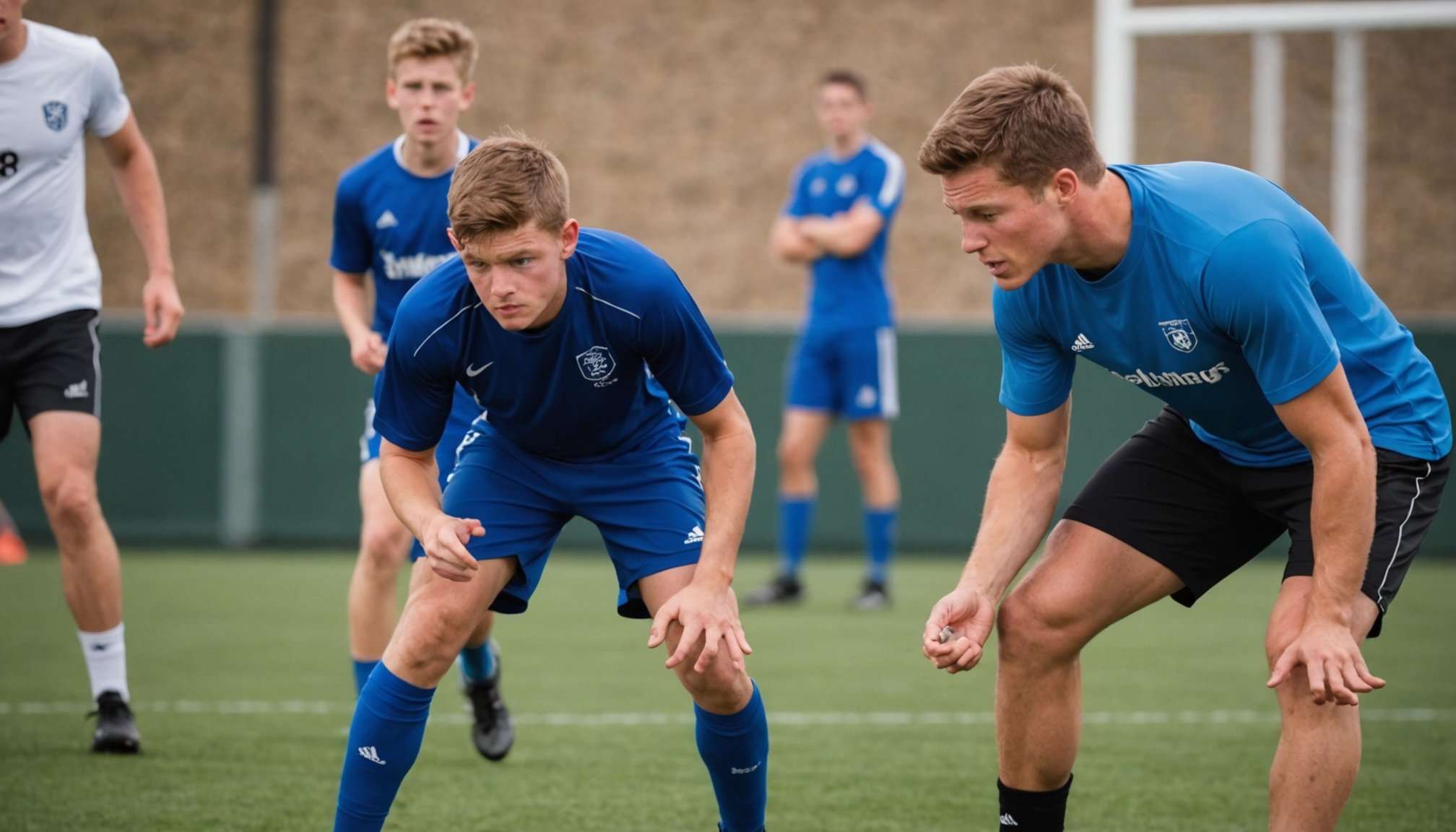Understanding Mental Toughness in Young Athletes
Mental toughness is a crucial quality that influences the success of young athletes in competitive environments such as sports academies. It involves the ability to maintain focus, resilience, and self-belief under pressure. This quality enables athletes to perform consistently, cope with challenges, and recover from setbacks.
Common traits of mentally tough athletes include unwavering determination, heightened resilience, and a disciplined approach to training and competition. These athletes possess an internal drive that pushes them beyond their perceived limits and helps them remain composed in high-pressure situations.
Also to see : Quenching the mind: how hydration enhances mental performance in long-distance running
The role of mental toughness in sports extends beyond just enhancing performance. It contributes significantly to building resilience, allowing young athletes to adapt to various circumstances and obstacles. This adaptation is paramount in sports, where unpredictability and intense pressure are common.
In sports academies, coaches can cultivate mental toughness by encouraging athletes to engage in various simulated scenarios that mimic real competition conditions. Through these simulations, young athletes learn to harness their focus and resilience, translating to improved sports performance. Understanding and developing this mental strength equips athletes to not only meet but exceed the demands of their chosen sports.
Also to read : Overcoming injury anxiety in gymnastics: proven techniques for mental resilience and success
Psychological Techniques for Developing Mental Toughness
To cultivate mental toughness in young athletes, employing specific psychological techniques is essential. These techniques can help athletes strengthen their resilience and improve their overall performance in demanding sports environments.
Visualization and Imagery
Visualization is a powerful tool, teaching athletes to picture success in their minds before achieving it physically. Effective visualization involves creating vivid, detailed images of desired outcomes and rehearsing skills mentally. This practice helps in managing stress and enhancing confidence by mentally ‘practising’ situations before facing them.
Goal Setting
Setting SMART goals—Specific, Measurable, Achievable, Relevant, and Time-bound—empowers young athletes with clear objectives to strive toward. This framework aids in sustaining motivation and directing focus, crucial for achieving incremental improvements and sustaining long-term dedication to their sport.
Positive Self-Talk
Uplifting self-talk plays a pivotal role in athletes’ performance. By encouraging positive affirmations and countering negative thoughts, self-talk fortifies self-belief and combats anxiety in tense situations. These verbal reinforcements keep athletes focused and resilient, guiding them to actively navigate the pressures of their sport.
Incorporating these psychological techniques in mental skills training not only bolsters young athletes’ resilience but also equips them with strategies to overcome challenges and excel in their performances.
Practical Training Strategies
The integration of training strategies for mental conditioning in physical workouts is crucial to enhancing sports performance. Structured mental conditioning exercises ensure that young athletes develop an enduring focus and concentration that rivals their physical strength. Facilitating mental training alongside physical routines augments overall athletic prowess.
Exercises to build focus and concentration can be woven into regular training schedules. Athletes may engage in activities like meditation, controlled breathing exercises, or concentration drills that push their cognitive limits. These exercises are designed to bolster meticulous attention and sustain mental clarity under pressure.
Incorporating sports simulations can deepen mental strength by replicating real-world challenges. Such simulations allow athletes to practise decision-making and stress management in a controlled environment. These training strategies bridge the gap between mental resilience and performance, enabling a cohesive development of both physical and mental faculties.
For young athletes, developing balanced mental conditioning fosters consistency and a competitive edge. As they learn to harness these strategies, they become better equipped to handle the rigours of competition, thereby enhancing their ability to excel in high-stakes sports settings. This congruence between mental and physical training unlocks a pathway to comprehensive sports success.
Age-Appropriate Methods for Various Levels
Developing mental toughness in young athletes requires tailored approaches that suit their developmental stages. By acknowledging the unique needs of different age groups and sports, training can address specific challenges athletes face at each stage.
Techniques for Younger Athletes
For younger athletes, engaging in playful mental challenges helps build mental toughness in an enjoyable way. Incorporating games that promote focus, resilience, and cooperation fosters a positive introduction to mental skills training. This age-appropriate method emphasises fun, ensuring early sports experiences are both enlightening and exciting.
Strategies for Adolescents
Adolescents experience emotional and psychological changes that can impact their performance. Here, psychological techniques like goal setting become vital, providing structure and clarity. Adolescents benefit from SMART goals, which channel their energy into achieving defined outcomes. Addressing these changes with empathy enhances their resilience and motivates continuous improvement.
Tailoring Approaches for Various Sports
Different sports necessitate distinct mental conditioning strategies. Customising training strategies to align with the demands of each sport ensures comprehensive mental development. For instance, individual sports may focus more on self-talk and imagery, while team sports might emphasise communication and collective resilience. Tailoring these approaches enriches the athlete’s mental toolkit, enhancing their capacity to meet specific sporting challenges.
Tips for Coaches and Parents
Supporting the mental toughness of young athletes requires a delicate balance of strategy, understanding, and encouragement from both coaches and parents. The coaching approach has a substantial impact on developing an athlete’s mindset. A positive coaching style that emphasises patience, encouragement, and constructive feedback fosters a more resilient and self-assured athlete. Encouraging athletes to embrace challenges as learning opportunities can further bolster their mental strength.
Equally important is parental support, which plays a crucial role in reinforcing the values of perseverance and resilience. By maintaining positive involvement, parents can aid in creating a nurturing environment where young athletes feel understood and motivated. This support extends to celebrating small victories and encouraging enthusiasm for the sport rather than just outcomes.
To create a supportive environment, coaches and parents should collaborate, ensuring consistent messaging about the importance of mental toughness. Strategies may include open communication, sharing insights, and actively participating in the athlete’s development journey. Encouraging athletes to manage setbacks and promoting self-reflection helps them process their experiences constructively.
In unison, these approaches cultivate an atmosphere where athletes are empowered to achieve success, resiliently navigating both triumphs and challenges in their sporting pursuits.
Case Studies and Real-Life Examples
In exploring mental toughness in sports, examining case studies can provide invaluable insights. These stories highlight the journey of athletes who exemplify resilience and determination, offering real-world applications and success stories. They are not merely tales of success but lessons in overcoming adversity.
Profiles of Mentally Tough Athletes
Athletes like Serena Williams exemplify this trait through consistent performances despite pressure. Her journey underscores the importance of self-belief and focus. By observing her and similar athletes, young ones can learn how mental resilience is cultivated through persistence.
Analyzing Successful Programs
Programs like the All Blacks’ mental skills training offer tangible insights into effective mental toughness development. Such initiatives highlight the role of structured psychological techniques in enhancing athlete experiences. These programs demonstrate how mental and physical training complement each other, fostering comprehensive athlete development.
Lessons from Sports Psychologists
Sports psychologists provide unique insights into nurturing mental toughness. Techniques, such as cognitive restructuring and strategic goal-setting, are often recommended. These methods reinforce athletes’ self-belief and adaptability, underpinning their performance in competitive environments. By applying these insights, athletes and coaches can effectively tackle mental toughness challenges.
Resources for Further Learning
Diving into resources dedicated to training resources can significantly enhance one’s understanding of mental toughness. Books, articles, and online courses provide valuable insights, offering a broader perspective on mental skills training.
Recommended Books and Articles: Books such as “The Champion’s Mind” by Jim Afremow and “Mind Gym” by Gary Mack explore the intricacies of mental toughness. These resources provide practical advice and real-life examples, making them invaluable for young athletes and coaches alike.
Online Courses and Certification Programs: Websites like Coursera and edX offer courses on sports psychology and athlete development. These courses, designed by experts, cover a wide range of topics including resilience and mental conditioning, equipping learners with the knowledge to train athletes effectively.
Workshops and seminars are excellent for hands-on learning about athlete mental conditioning. Attending these events fosters practical skills development and networking opportunities with professionals in the field.
For those keen on deepening their understanding, further reading and workshops provide expansive learning opportunities. By actively engaging in these resources, coaches and parents can more effectively support the athlete development journey, empowering athletes with the mental toughness needed to thrive.

